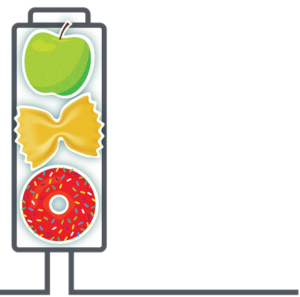An E-Newsletter for Neighbors Served by Food Bank Programs & Partners
We’d love to keep you up-to-date on distribution schedules & changes, special events, and more. That’s why we’re launching Nourish., a brand new e-newsletter. Sign up today to join the mailing list.
Nutrition on Wheels at Distributions
Nutrition on Wheels (NOW) is provided by the Food Bank at Mobile Harvest and Produce on Wheels distribution sites. The Food Bank’s Mobile Harvest & Produce on Wheels trucks deliver fruits and vegetables into 40+ neighborhoods every month, year round. Families who otherwise cannot access or afford to buy fresh produce come to meet the truck at a site in their neighborhood, and go home with a generous supply of produce and other perishable foods, including dairy, yogurt, etc. While they are waiting to check-in, a bilingual nutrition educator sets up a table and talks with clients about pertinent nutrition topics in the form of short nutrition lessons.
Nutrition on Wheels Schedule & Monthly Lesson:
On hold – please check back
Monthly Lesson Archive:
April 2024 Lesson: Vary Your Protein | March 2024 Lesson: Vary Your Vegetables | February 2024 Lesson: 10 Ways to Improve Your Heart Health – Lección de febrero de 2024: 10 maneras de mejorar tu salud cardíaca | January 2024 Lesson: Finding Balance After the Holidays | December 2023 Lesson: Mindfulness During the Holidays | November 2023 Lesson: Let’s Talk Turkey | October 2023: Supporting Wellness at Pantries Stoplight Guide

SWAP (Supporting Wellness at Pantries)
You may notice the symbols from this stoplight when visiting a Food Bank partner pantry. Aside from being the cutest stoplight we’ve ever seen, the symbols can play an important role in helping you make healthy and nutritious choices while visiting a food pantry.
Food supplies the nutrients needed to fuel your body so you can perform your best. The SWAP stoplight system is a simple way to recognize foods that promote health and good nutrition when visiting food banks and food pantries. SWAP ranks foods based on levels of saturated fat, sodium, and added sugars because these nutrients are linked with increased risk of chronic diseases.
GREEN – CHOOSE OFTEN
Low in saturated fat, sodium, and added sugar; supports health
Some examples of GREEN foods include:
-
All fresh fruits and vegetables
-
Whole eggs
-
Whole grain bread, pasta, tortillas
-
Brown rice
-
Skim, 1%, and 2% milk
-
Plain water, coffee, and tea
YELLOW – CHOOSE SOMETIMES
Moderate levels of fat, sodium, or added sugar; can contribute to good health
Some examples of YELLOW foods include:
-
100% fruit juice
-
Regular “white” bread, pasta, tortillas
-
White rice
-
Whole milk
-
Most peanut butter
-
Plain dried fruit such as raisins
RED – CHOOSE RARELY
High levels of fat, sodium, or added sugar; think of as treats; limited health benefits
Some examples of RED foods include:
-
Desserts such as ice cream, cookies, cake
-
Candy
-
Most processed / packaged snacks
-
Regular soda and juice drinks
 SWAP was developed by the Institute for Hunger Research & Solutions at Connecticut Foodshare.
SWAP was developed by the Institute for Hunger Research & Solutions at Connecticut Foodshare.
For more information about the Food Bank’s nutrition programs, please contact director of programs, Sarah Sanchez, at (775) 331-3663 ext 114.







 SWAP was developed by the Institute for Hunger Research & Solutions at Connecticut Foodshare.
SWAP was developed by the Institute for Hunger Research & Solutions at Connecticut Foodshare.


